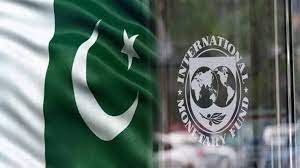Pakistan’s scramble for a staff-level deal with the IMF (International Monetary Fund) seems to be getting nowhere as the two sides remain deadlocked, unable to bridge their differences of opinion – even though Pakistan has agreed to jack up energy and utility prices.
A staff-level agreement is a prerequisite to signing a fresh Memorandum of Financial and Economic Policies (MEFP) for the USD 6 billion Extended Fund Facility (EFF) approved by the Executive Board on July 2019.
Advisor to PM on Finance and Revenue Shaukat Tarin cancelled his scheduled visit to London to extend his stay in the United States and but an agreement could not be reached within the stipulated timeframe.
At a time when Pakistan and the IMF were holding parleys to accomplish the 6th review under EFF, Islamabad hiked petrol and diesel prices by PKR 10 to PKR 12 per litre respectively and raised electricity tariff by PKR 1.39 per unit. None of this, however, could placate the IMF, clearly intent on playing hardball with Pakistan this time.
Among the last remaining sticking point seems to be how to pace the putative reform measures, chiefly comprising of adjustments on fiscal, monetary, and exchange rate fronts. The IMF staff insist on all conditions being met upfront within the current fiscal while the Pakistani side is pushing for a more graduated approach.
Apparently, the Fund is wary the government may abandon the program after drawing the current tranche of the facility instead of pushing through with the agreed reform in view of the coming general election.
The next fiscal year (2022-23) coincides with the last year of the constitutional term of the incumbent government. Expecting that a government beholden to the ballot would steer clear of political expediency in an election year would simply be expecting too much.
Now both Pakistan and the IMF keep saying they are inching closer to a staff-level agreement for completion of the 6th review, but so far the parleys being held at Washington DC have remained inconclusive as of the filing of this report.
Top Ministry of Finance officials are confident an agreement could be struck anytime as the two sides have achieved agreement on 99 percentage points – but they are wary of giving any timeframe for the agreement.
The IMF did share a draft of MEFP having tables one to nine so evolving consensus on the pace of adjustments would pave the way for a staff-level agreement between the IMF and Pakistani side.
Another point of contention between Pakistan and the Fund is the implementation of the Treasury Single Account to consolidate all the government’s banking transactions.
The Fund has been nudging Islamabad in the direction of TSA one way or another since 2008 when Pakistan signed a stand-by agreement. Pakistani authorities acknowledge the importance and benefits of the TSA in the government’s cash flow and debt management, but they believe its implementation is a time-consuming process.
In April this year, when the second through fifth reviews of the ongoing EFF were conducted, Pakistan committed to completing phase 1 of the implementation of TSA (TSA-1) by end-May and move to phase 2 of the program (TSA-2) soon after.
This would involve transferring around PKR 3 trillion in government funds from commercial bank accounts maintained by federal ministries and divisions and provincial departments to State Bank of Pakistan’s federal consolidated fund.
The Fund is now pushing for TSA-1 to be completed by December 2021. This would require all commercial bank accounts by public sector entities to be closed and the funds held in those accounts to be transferred to the single treasury account set up with the State Bank of Pakistan for this purpose.
Pakistan, on the other hand, is now asking for at least two more years to complete TSA-1. The IMF has reportedly gone one step ahead by pushing for an early completion of TSA-2, requiring the attached departments of the Ministry of Defence and the Armed Forces to transfer their funds into TSA in SBP’s Federal Consolidated Fund (FCF).
TSA is by no means the only agreed target Pakistan has missed. The Fund staff are flummoxed over how drastically Pakistan’s budget 2021-22 estimates and projections have been overtaken by circumstances only a quarter into the new fiscal year.
The current account deficit surged to USD 3.4 billion in the first quarter so it could go up to USD 14 billion keeping in view the existing pace against SBP’s projection of USD 6 to USD 9 billion for the current fiscal year.
The import bill have ballooned to around USD 20 billion in the first three months and at the existing pace, it might go close to USD 78 billion by the year end. The curtailment of imports is essential but it could be curtailed at USD 5 billion so the import bill could be restricted to USD 65 billion.
Pakistan needs to undertake a combination of steps on the exchange rate, monetary policy stance, and fiscal fronts, failing which the current account deficit could go out of control.
On the eve of the budget, the government had envisaged the CAD at just USD 2.3 billion for the whole fiscal year and now a gap of over USD 12 billion had surfaced. Now the IMF is suggesting adjustments to slash the CAD by at least USD 5 to USD 6 billion.
Within the last two weeks, Pakistan’s foreign currency reserves held by SBP eroded by USD 1.6 billion mainly because of the maturity of the international bonds as Pakistan paid back USD 1 billion on the five-year maturity of the Sukuk bond issue of 2016.
On the fiscal front, the IMF identified a gap of PKR 500 billion on account of petroleum levy as the government was charging just PKR 5 to 6 per litre on petrol and diesel so the Fund is suggesting either to jack up petroleum by PKR 25 to PKR 30 per litre and bring GST at the standard rate of 17 percent on POL products.
As an alternate, the IMF is also suggesting to do away with GST exemptions in order to fetch PKR 250 to PKR 300 billion, reduce the number of Personal Income Tax (PIT) slabs and increase tax rates on higher income brackets as well as slapping Regulatory Duty (RD) on luxury goods.
Another catch is that restricting imports will also hurt FBR’s tax collection so the IMF considers that the taxation measures are essential on an immediate basis for striking staff-level agreement.
On discount rate, the IMF asks for raising policy rate from 7.25 percent to around 8 to 8.5 percent in the next monetary policy committee meeting.
Prime Minister Imran Khan’s government is in a quandary as it faces tough choices either with or without the Fund program, mainly because of the era of window dressing the rotting merchandise is over and time is ripe for Pakistan to bite the bullet and tough and painful measure to fix the country’s struggling economy.
Former economic advisor and renowned economist Dr Ashfaque Hassan Khan says he had advised PM Khan against seeking IMF assistance in one of the Economic Advisory Council (EAC) meetings. His reasoning was that to keep the IMF funding flowing, Islamabad would be hard-pressed to appease the United States, which was an impossibility in the emerging geostrategic situation.
In the absence of a Fund program, the IMF assesses that Pakistan’s gross financing requirements in the current 2021-22 and next fiscal year 2022-23 would be standing at over USD 51 billion according to conservative estimates.
But if the yawning current account deficit gets out of control then the gross financing requirement might go up further and could touch USD 60 billion mark during the remaining period of Khan’s term.
On in-depth analysis, power sector finance and taxation surface as the two most crucial areas to steer the economy out of crisis. Pakistan has no other option but to undertake serious steps to broaden the narrow tax base and fix the cash-bleeding energy sector by undertaking privatisation of power distribution companies (DISCOs).
No easy solutions exists at this juncture of our chequered economic history. There are tough solutions ahead and the incumbent rulers will have to choose a path where the country can rise to its feet against all odds. That would require pursuing the path of self-reliance and move towards enhancing productivity and efficiency to achieve a high-growth trajectory without creating any imbalances on internal and external accounts of the national economy.










